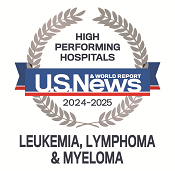Treatment and Services

At UM Upper Chesapeake Health, we believe in providing the very best possible care to our patients. Our oncologists and specialists work together to develop a complete and coordinated treatment plan.
We provide advanced cancer treatments, state-of-the-art technology, integrative therapies and enhanced supportive services in one convenient location in Harford County.
Treatment and Services We Offer
We provide a wide range of services for people who need cancer treatment and those dealing with the effects of fighting cancer.
Medical Oncology
Our medical oncologists serve as the primary care provider for anyone getting cancer treatment, coordinating a treatment plan and following up after treatment to keep patients healthy.
Radiation Therapy
Radiation therapy at the Kaufman Cancer Center is directed by a team of highly-trained experts who helped develop the technology. Our advanced radiation treatments help minimize side effects while improving survival rates.
Chemotherapy
Chemotherapy is used to destroy cancer cells and prevent cancer from spreading throughout the body. Learn more about getting chemotherapy at Kaufman Cancer Center.
Surgery
Surgery is an option for many stages and types of tumors, from the most straightforward cancers to advanced and recurring cancers. Our experienced surgeons are specially trained in minimally invasive techniques and work with you to identify the best surgical plan. Our minimally invasive surgeries allow for faster recovery and fewer side effects.
Pathology
Pathology is the study of tissue samples that are usually taken from a tumor or lymph node. It determines if cancer has spread to other areas of the body, which helps decide the best course of treatment. Our pathology specialists are an important part of your care team. They attend meetings with other providers and specialists who review your medical records and tests to make decisions on your care (known as tumor board meetings) and provide expert recommendations to your individual care plan.
Rehabilitation
Our rehabilitation programs help you with side effects of cancer and cancer treatment, targeting brain and mental functioning, neuropathy, lymphedema, pelvic floor issues and more. Learn about the rehabilitation services we offer.
Pain Management
Many people with cancer experience pain that's related to the cancer itself, and also pain from treatment. However, prompt and effective pain control can help prevent suffering and significantly improve a patient's quality of life, despite diagnosis. Our outpatient oncology pain clinic is led by experts who specialize in pain management and who work directly with each individual patient and his or her family to develop a care plan to help manage pain and discomfort. Call 443-643-1956 for more information.
Palliative Care
Palliative care focuses on improving the overall quality of life for patients facing cancer. It provides symptom relief and can occur at the same time as all other care. It does not depend on a patient's prognosis.
Cardio Oncology
Cancer and its treatment can weaken your cardiovascular health, which is why we've developed a special cardio oncology program to help people regain cardiovascular health and prevent further damage. Learn about our cardio oncology program.
Reconstructive Surgery
Sometimes treatment and surgery for cancer can affect an individual's appearance. Reconstructive surgery is an option that some patients may consider after completing treatment with the goal of restoring function and appearance. It can play a major role in helping people improve their body image and regain their confidence. Learn more about our reconstructive surgery services.
Genetic Counseling
The UM Greenebaum Comprehensive Cancer Center supports the Kaufman Cancer Center with certified genetic counselors. They have extensive training and experience to assist individuals and their families with decisions regarding genetic testing and how to understand the results.
Undergoing treatment for cancer can be very challenging, and that's why our cancer Patient And Family Advisory Council (PFAC) was established — to create a comforting and safe place for patients and their families to provide feedback on their care. The diverse group, consisting of cancer patients, family members and members of our cancer center leadership team, work to ensure the best possible care and support are delivered to every patient. Learn more by calling 443-643-3352.
Our Locations
Created with the comfort of our patients and their families in mind, the Kaufman Cancer Center believes in treating the whole patient, and not just the cancer. We provide the convenience of a community cancer center with the expertise of an academic medical center, and make access to national experts, the latest treatments and promising clinical trials available right here in Harford County. The Kaufman Cancer Center's dedication to providing high-quality care and supportive wellness resources helped it earn accreditation by the American College of Surgeons Commission on Cancer.
We also provide some cancer treatment services at our Aberdeen hematology and oncology location.
Our affiliation with the UM Marlene and Stewart Greenebaum Comprehensive Cancer Center means you have easy access to one of the country's leading hospitals.

